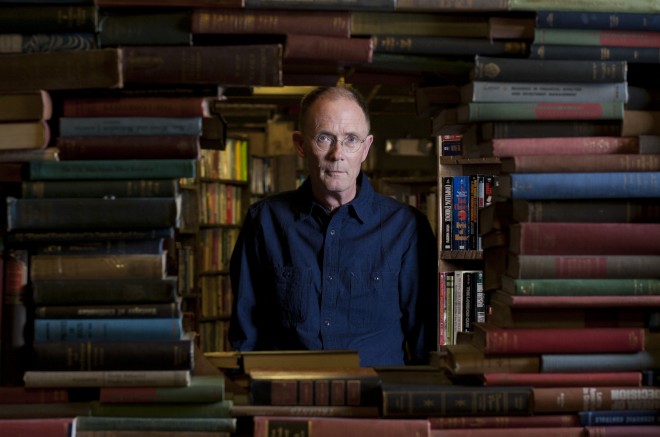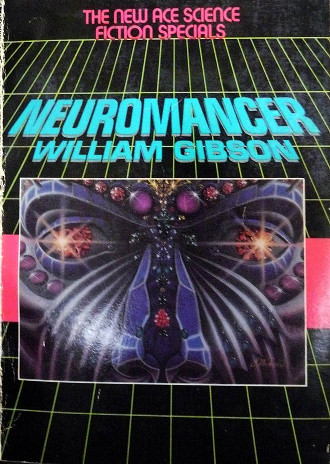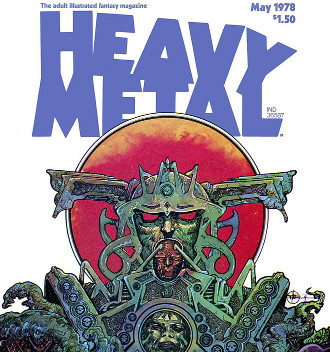Interview with William Gibson to Wired Magazine. Part 1
- Transfer

It is difficult to find a science-fiction writer, so original and possessing such a prophetic gift as William Gibson. The writer himself claims that neither he nor his colleagues have any magical abilities to look into the future.
“We are almost always wrong,” he said in a telephone interview with Wired. Gibson is a man who in 1982, in the story “Burning Chrome”, coined the word “cyberspace”, and two years later, in the debut novel “Neuromancer”, expanded and deepened this concept.
In a book that quickly became a classic and a source of inspiration for science-fiction writers of the coming decades, Gibson predicted that the “consensual hallucination” of cyberspace would be “the daily reality for billions of users in all the world’s old nations,” united in a global network of “inconceivable complexity”.
Since then, Gibson has written many equally successful and critically acclaimed novels, including The Count Zero (1986), Mona Lisa Overdrive (1988), The Difference Machine (co-authored with Bruce Sterling, 1990), Recognition images ”(2003),“ Zero History ”(2010). Yet Gibson says he was just lucky to create a prophetic description of the digital world. “The fact that the“ Neuromant ”describes how the network of the future, like the Internet, in fact is completely different from the real Internet,” he said in an interview.
Gibson's latest book, Distrust That Particular Flavor, a collection of non-fiction stories, was released this year; Now he is writing a new novel under the working title “The Peripheral”.
In an interview that will be published in three parts, Gibson touches on a dizzying range of topics - from antique watches to comics, from punk rock to visionaries, from Internet memes to film adaptations of Neuromancer.
Wired: Do you think it's worth talking about “science fiction” as a separate genre? In your latest books, for example, from the trilogy about the Blue Ant Corporation, the action takes place in a world very close to modern realities.
Gibson: Yes, the plot of each of them unfolds in the year preceding the year of publication. These are books about a hypothetically possible recent past, and not about a hypothetically possible future. They are saturated with the spirit of fiction, but this is not entirely fiction. I did it intentionally and consciously. Well, that is, at the very beginning it was not entirely intentional, but over time, the concept has matured and strengthened.
When I was finishing my sixth novel, “All the Parties of Tomorrow,” I was constantly haunted by the feeling that the world around me was so strange and bizarre that I could no longer accurately measure and recognize this oddity that constantly surrounded me.
Without the opportunity to experience the “level of bizarreness” of the present, I could not decide how fantastic I should make an imaginary future. That's why the last three books turned out the way they turned out - I needed a kind of standard of fantasticness, which I could measure the last decade. Judging by the book I'm working on now, I succeeded. I found the strength to build on the basis of the fantastic reality of the present an even more fantastic world of the future ...
What matters to me the least is how accurately fiction predicts the future. Her success in this matter is very, very mediocre. If you look at the history of science fiction, what writers thought should have happened, and what really happened, things are very bad. We are almost always mistaken. Our reputation as visionaries is based on the ability of people to be amazed when we manage to guess something. Arthur Clarke predicted communications satellites and more. Yes, it is amazing when one of us is right, but more often than not, we are mistaken.
If you read a lot of old fiction, as I did, you will certainly see how much we were mistaken. I missed much more often than hit the mark. But I was ready for it. I knew about this before I even started writing. There is nothing to be done about it.
In a way, if you don't make enough mistakes when you come up with an imaginary future, then you just don't try hard enough. Your imagination does not work to the full. Because if you give him free rein, you will be mistaken, and you will be mistaken a lot. Wired: Yet people are constantly discussing how prophetic the Neuromancer turned out to be, and how accurate your descriptions of the future are. Gibson:

Yes, people often talk about it. It's just that our culture has such a special attitude to predictions. But science fiction writers are not seers. In fact, there are no seers. All of them are either crazy or charlatans. However, there are crazy and charlatans among science fiction writers too, I know several of them. Just sometimes, if you need to give free rein to the imagination, look at things with an open mind, it turns out to come up with something that really happens afterwards. When this happens, it’s wonderful, but there is no magic in it. In our language there are no words other than magic or sorcery with which you can describe the work of science fiction writers and generally anyone who deals with the future.
Sometimes someone on the Internet will take, and even call me an “oracle” ... And as soon as the word related to magic sounded, I already know this from experience - as soon as someone said “oracle”, that’s it, bang! - the word is heard by everyone, it is repeated endlessly. This is probably good for business. And then I have to persuade people for a long time that I have a magical prophetic gift ... In fact, if you are not too lazy and thoroughly google everything related to William Gibson, you will find tons of texts and posts in which people discuss and discuss how often I was wrong. Where are the mobile phones? And neural networks? Why is there such a slow Internet in the world of Neuromancer? Probably, I myself could write a good critical article about Neurormant to convince readers that everything is wrong there.
What is described in Neuromant as a network of the future, like the Internet, actually does not at all resemble the real Internet. I described something. I could not correctly guess what it would be, but I managed to convey the feeling of this “something”. And thanks to this feeling, I got ahead of everyone. It's not even that the other predictions were worse. It’s just that in the early 80s there were very few science fiction writers who paid attention to computer networks. They wrote about something else.
I was lucky, incredibly lucky - I got carried away in time with the idea of writing about the digital world. Incredible luck! When I wrote a novel, or rather, even earlier, two years before that, when I wrote a couple of stories, from which “Neuromancer” later grew, from which the entire universe of “Neuromancer” grew up, it took me a week or two for everyone — I wrote and thought: “If only to be in time! If only to have time to publish them before another 20,000 people who are writing exactly the same thing right now publish their own! ”Because I thought it was completely banal. I thought: “Here it is! "The time of steam engines" for such subjects has come. "
Do you know what “steam engine time” is? People have been making toy steam cars for thousands of years. They were able to make the Greeks. The Chinese knew how to do them. Many different nations made them. They knew how to make small metal gizmos spin with steam. No one could ever find any use for this. And suddenly someone in Europe is building a large steam engine in his barn. And the industrial revolution begins. The time has come for steam engines. When I wrote these two stories, I did not even know what the coming decades would be called the "digital era." But it was the time of steam engines. It has come.
Someone in England then started selling book-sized computers. I didn’t know — yes it was and it didn’t matter to me — that in a few years the Casio wristwatch would be more powerful than these computers, it was enough for me that they can already be bought today and that they are very small. I thought: “So, over time, they will become cheaper and more widespread. What will people do with them? ”The picture in my head was absolutely natural and obvious. A few years after that, I never ceased to be surprised that I didn’t have a huge wave of writers behind me that would crush and swallow me after I opened the gateways with these small stories about cyberspace. The wave finally came, but it happened later than I expected. That was weird. I greatly benefited from this.
Wired:You recently tweeted that you were planning a new novel, The Peripheral. What can you tell us about him?
Gibson: Even on Twitter, I said too much. Twitter is the only place where I succumbed to the temptation to change my deep, instinctive fear of discussing current work. I can not add anything to what I said there. But since I blabbed, I repeat it here - the plot of the novel is developing not just in the future, but in two whole versions of the future. So those who miss all these “Gibsonish things” from the future will find in them what they want. Wired: Are you reading comics now? You once said that, among other things, one French comic book was a source of inspiration for Neuromancer. Gibson:

Yes, something like that happened when I was flipping through the English language releases of Heavy Metal in the comic book shop on the corner. Usually I just leafed through them, but did not buy. Comics were one of the few joys in my not-so-rich experience. I adored them, like all the children at that time. And as a teenager, I also loved them, but when I became a little older, my life changed a lot, a lot of things happened and I abandoned my childhood hobby. So I missed the Marvel revolution . When I felt interest in them again, the era of underground comics Zap and Robert Kramba was in full swing . After that, I was never really fond of comics again. If I were born ten or twenty years later, I would probably still love them.
Now I rarely read comics. Sometimes I like them, but usually because I personally know the author or one of his friends. Recently, this has been happening less and less. But there is still a lot of comics around me - at one time my daughter was seriously interested in indie comics, and still loves them. True, I suspect that one of the reasons for her hobby was that I do not understand anything about them. This is probably right. When she talks to me about literature, I can’t resist the advice - “Read this, be sure to read this.” Everyone should have their own, exclusive sphere of interests. This is necessary to decide in life.
Wired:What do you think of the fashion of recent years for Hollywood adaptations of classic fiction? Here, for example, they are going to shoot Heinlein's “Landing Troopers” again, Cronenberg's “Video Drome” will be re-shot ...
Gibson: Really? Will they make an action movie from Videodrom?
Wired: Yes, and Kronenberg will not shoot it.
Gibson:Well ... [laughs] To be honest, now I follow less Hollywood movies than before. I think the reason is that it has turned into a big business, conservative and without risky experiments. Therefore, they often shoot remakes of successful or cult films. From an accounting point of view, this is a safe investment. However, in the last three years, there have been more science fiction films that are neither remakes, nor blockbusters with a huge budget. I like them and, I think, they will become classics. I have a hope that we live in an era of interesting, exciting and original films.
Wired: Give some examples.
Gibson:“Beginning”, although he, of course, has a big budget, “Moon 2112”, “Source Code”, “Hannah” - if only this film can be considered fantastic. I think he is close to this genre. In fact, the complete list is much longer, just now I do not remember everything. Another Chimera, for example ...
The second part is about Twitter, antique watches and Internet addiction.
The third part is about punk rock, internet memes and Gangnam Style.
